March 23, 2013
by Robin Parker -
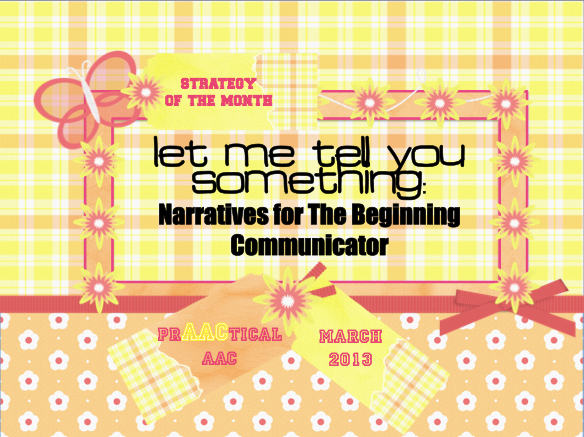
March continues with story telling or narratives as the Strategy of the Month. All learners have stories to tell but some may need special teaching to be able to express their stories. Goals for the beginning communicator can and should include narratives. Personal narratives are a good place to begin but any type of narrative can be taught with structure, routines, partner support, prAACtical strategies. Robust communication includes story telling. Yes, beginning communicators need to be able to express wants and needs however, authentic and comprehensive language involves much more. The quicker we start teaching, the quicker beginning communicators (or anyone) can learn. Beginning Communicator Narratives 3 Types (Just some of the options) Remnant Books are a visual and tactile way of telling stories by recording important events. Learners can help choose items from meaningful personal experiences which serve as a reminder of stories to tell. Create routines and visual supports... [Read More...]
January 5, 2024
by Carole Zangari -
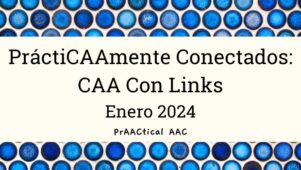
Each month we feature a Spanish version of our AAC Link Up, CAA con Links. If you have AAC-related announcements, materials, or videos in Spanish that you would like others to know about, we’d love to have you add that information below. Also, please share this with anyone who might be interested in contributing to or using the materials that get added to these posts. You’ll find the place to add that information at the very bottom of this post. Organized by Claudia Marimón, these monthly posts also feature AAC work being done in Spanish-speaking countries and offer translations of material that can help families and service providers. In today’s post, Claudia discusses the PODD approach to communication books. Take a look at the information, and don’t forget to scroll to the bottom to add your link and see what others are sharing. :::::::::::::::::::::::::::::::::::::::::::::::::::::::::::::::::::::::::::::::::::::::::::: Bienvenido 2024, comienzo este nuevo año... [Read More...]
September 1, 2023
by Carole Zangari -
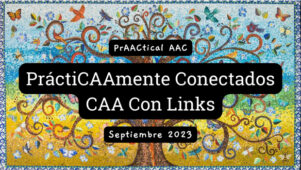
We are back with another Spanish version of our AAC Link Up, CAA con Links. If you have AAC-related announcements, materials, or videos in Spanish that you would like others to know about, we’d love to have you add that information below. Also, please share this with anyone who might be interested in contributing to or using the materials that get added to these posts. You’ll find the place to add that information at the very bottom of this post. Organized by Claudia Marimón, these monthly posts also feature AAC work being done in Spanish-speaking countries and offer translations of material that can help families and service providers. Today, Claudia shares the AAC work being done at Kallpa Educational Association in Lima, Peru. Enjoy the post, and remember to scroll to the bottom to add your link and see what others are sharing. Iniciamos el mes de Septiembre con mucha... [Read More...]
August 27, 2023
by Carole Zangari -

Welcome to Stepping into AAC ! Stepping into AAC is a collaborative project created by PrAACtical AAC and the Angelman Syndrome Foundation (ASF) that focuses on supporting families who want to integrate AAC into their lives. There are 20 weeks of Stepping into AAC materials, which are intended to provide simple, week-by-week resources to help families support beginning communicators of all ages. Each week, there are easy hands-on activities, videos and companion handouts, and a newsletter to learn from. Thanks to the generous support of the ASF, these materials are available at no charge. Stepping into AAC is designed for families that include: Children, adolescents, and adults who are new to AAC and would benefit from using communication aids with high-frequency words or core vocabulary; and Individuals of any age who previously used AAC but are not currently communicating with it throughout the day. We hope that Stepping into AAC... [Read More...]
May 15, 2023
by Carole Zangari -
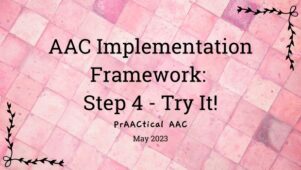
We’re so pleased to welcome back PrAACtical AAC friend Vicki Clarke to these pages for another article in the AAC Implementation Framework series. Vicki heads up an AAC-focused private practice, Dynamic Therapy Associates, and is also the Director of DTA Schools. Today’s post includes ‘next step’ information to guide others in implementing AAC along with some helpful AAC posters for you to download, and a video with implementation tips. If you are new to this series you can find the earlier posts through the links below. Steps to Learning Step 1, Determining the Target Step 2: TRAIN Step 3: Take In AAC 101: Steps To Learning Step 4: Try It! As we know, Augmentative and Alternative Communication (AAC) is an essential tool for individuals with speech and language disabilities to communicate effectively and engage in social interactions. Our 4th Step: Try It is about supporting our students as... [Read More...]
April 7, 2023
by Carole Zangari -
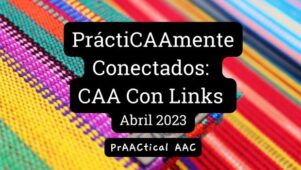
Each month we feature a Spanish version of our AAC Link Up, CAA con Links. If you have AAC-related announcements, materials, or videos in Spanish that you would like others to know about, we’d love to have you add that information below. Also, please share this with anyone who might be interested in contributing to or using the materials that get added to these posts. You’ll find the place to add that information at the very bottom of this post. Organized by Claudia Marimón, these monthly posts also feature AAC work being done in Spanish-speaking countries and offer translations of material that can help families and service providers. Today, she partners with Rita María Aceituno in focusing on the AAC support provided to Guatemalan children with Down Syndrome by Fundación Margarita Tejada. Enjoy the post, and remember to scroll to the bottom to add your link and see what others... [Read More...]
January 9, 2023
by Carole Zangari -
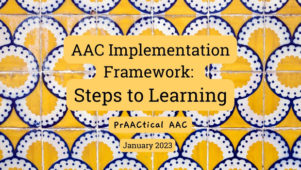
We’re so pleased to welcome PrAACtical AAC contributor Vicki Clarke back to these pages. While you may remember Vicki from her outstanding AAC Assessment Corner posts, her most recent efforts focus on strengthening our AAC practices. Throughout the series, Vicki draws on her experiences supporting AAC users and teams in clinical and school settings and shares prAACtical information that we can all learn from Introduction to AAC 101 Steps to Learning It is no small task to consider how we will help our students progress from communicating only through behaviors to communicating any message they desire independently and spontaneously. In fact, in 1997, Gloria Soto conducted survey research that tells us: Teachers have always believed that communication training for students is positive, and Communication training is a collaborative effort between teachers and SLPs, Despite these beliefs, there is still a prevalent hesitancy to begin to explicitly instruct students in AAC.... [Read More...]
December 2, 2022
by Carole Zangari -
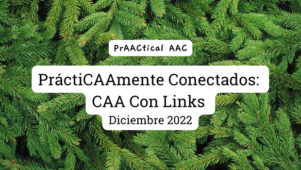
Each month we feature a Spanish version of our AAC Link Up, CAA con Links. If you have AAC-related announcements, materials, or videos in Spanish that you would like others to know about, we’d love to have you add that information below. Also, please share this with anyone who might be interested in contributing to or using the materials that get added to these posts. You’ll find the place to add that information at the very bottom of this post. Organized by Claudia Marimón, these monthly posts also feature AAC work being done in Spanish-speaking countries and offer translations of material that can help families and service providers. Today’s post focuses on supporting literacy and AAC featuring a fun Christmas book. Take a look and don’t forget to scroll to the bottom to add your link and see what others are sharing. ::::::::::::::::::::::::::::::::::::::::::::::::::: Comenzando Diciembre queremos invitar a nuestra comunidad... [Read More...]
October 6, 2022
by Carole Zangari -
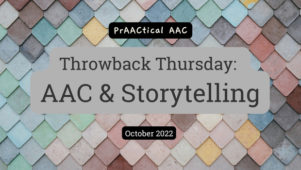
Telling stories is such an integral part of the human experience. While any symbolic communicator can create or co-create narratives, it’s not something that is taught as often as it should be. If you’re looking to enhance intervention to build narrative skills, these posts may be of interest. Helping People with AAC Needs Develop Personal Narratives Video: Personal Narrative Writing & AAC PrAACtical AAC & Personal Narratives Let Me Tell You Something- Narratives for the Beginning Communicator Narrative Assessment and People who Use AAC Narrative Skills for People With AAC Needs The PrAACtical Power of Co-Construction in AAC Support Video: Narrative Skills in Students with ASD
April 13, 2022
by Carole Zangari -
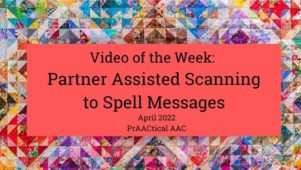
Partner-assisted scanning is a versatile access strategy that can be extremely beneficial for people with significant motor challenges. In today’s featured video, AAC expert and master clinician John Costello discusses how to use it for spelling and demonstrates this powerful strategy. You can learn more and download a copy of the communication materials here. Direct Link to Video – https://www.youtube.com/watch?v=KyBkofHqBkY&t=6s&ab_channel=JohnCostello









